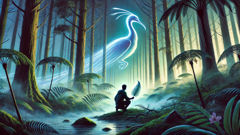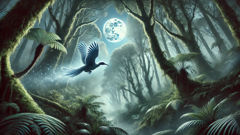Introduction
In the time before time, when Aotearoa’s ancient forests whispered with untold stories and the seas sang in a language all their own, the people of the land lived in close harmony with every living thing. The land was raw and alive: great kauri and rimu trees stretched skyward like pillars holding up the sky, their roots entwined with ferns and mosses that glowed with morning dew. The wild winds swept down from the snow-capped peaks of the Southern Alps, carrying secrets from the gods and ancestors. Along the jagged coasts, the ocean roared and sighed—its tides watched over by the spirit beings who moved between realms, keeping the world in sacred balance. Among these mystical guardians was the Manaia, a being unlike any other—its form a living tapestry of bird, man, and fish, each part a symbol of its role as the eternal messenger. The Manaia’s head, sharp-beaked and crowned with feathers, could see what others could not—into the past, present, and shimmering possibilities of the future. Its body, strong and lithe like a skilled hunter, was a reminder of the human heart and its courage. And its tail, sleek and scaled, whispered of the ocean’s depths and the mysteries hidden beneath the waves. In this land of mists and mountains, the Manaia moved unseen yet ever-present, drifting along moonlit ridges or gliding beneath the boughs of giant trees, always watching, always listening. Some believed the Manaia to be a guardian spirit, others saw it as a messenger between mortals and the world of the atua—the gods—carrying prayers and warnings, wisdom and protection. Children would stare into the bush’s shadows, hoping for a flash of iridescent feather or a glint of golden scales. Elders wove stories by firelight, painting images of the Manaia onto wood, bone, and skin—stylized forms etched with reverence and awe. It was said that in moments of crisis or change, when the boundaries between worlds thinned, the Manaia would appear to those most in need. Its coming was heralded by the sudden hush of birdsong, the quiver of fern fronds, and the taste of sea salt on the wind, even far from the shore. In the tale that follows, we journey into this primeval Aotearoa, where a young tohunga—a priest and healer—named Rereahu must confront darkness threatening his people. Guided by dreams and the wisdom of his ancestors, Rereahu embarks on a quest that will test his courage, challenge his understanding, and draw him ever closer to the elusive Manaia. What follows is not just a tale of adventure, but a story woven from the deepest threads of Maori belief: that all life is connected, that wisdom is found in listening to land and sea, and that the greatest journeys are those that reveal the heart’s true purpose.
Whispers in the Ferns: The Call of the Manaia
Rereahu was born beneath the canopy of giants—a son of rangatira lineage, steeped in the wisdom of his elders and the songs of his ancestors. From his earliest days, he felt the pulse of the forest beneath his feet, the thrum of rivers in his veins. His mother, Kahu, was a revered tohunga, known for her deep connection to both spirit and land. From her, Rereahu learned that every stone, every tree, every wave was alive with mauri, the life force that flows through all things.

Yet, even in such a blessed place, shadows sometimes stretched across the land. Aotearoa’s people relied on balance—between sky and earth, sea and soil, body and spirit. When that balance was threatened, the world itself would grow restless. Rereahu first sensed this unease as a boy. Birds fell silent at odd hours. Koru ferns curled inwards when they should have unfurled in the dawn. On certain nights, a chill would settle over the village, and dreams would come to him—vivid and strange.
In his dreams, Rereahu walked along a shore where the sea was dark as obsidian. The moon hung low and enormous, casting a path of silver light that led out into the unknown. On this shore, he saw the Manaia for the first time: feathered crest rippling, human eyes filled with sadness and resolve, tail gleaming as it moved between worlds. The Manaia beckoned him, but when he reached out, it dissolved into mist and memory.
For years, these dreams returned. Each time, Rereahu awoke with a sense of longing and a growing certainty that something was coming—a test or a message. He began to notice signs in the waking world as well: carved Manaia figures on ancestral pendants would shimmer in the firelight; the call of the tui bird seemed to echo with strange urgency; once, he even found a feather unlike any he’d seen before, its barbs iridescent green and blue, left on the doorstep of his whare.
It was during one particularly restless season, when storms battered the coast and whales stranded themselves on distant sands, that Rereahu’s village faced calamity. Fish vanished from their customary grounds. The river’s water tasted metallic, and crops grew sickly. Elders gathered in council, reading omens in cloud shapes and patterns of eels. Some spoke of angered spirits, others of a curse loosed by careless hands. Kahu, wise and measured, listened to all and then turned to her son. “You have been called, Rereahu. The Manaia has marked you in dreams and in waking. Our world trembles on the edge. You must seek the messenger.”
Rereahu’s heart raced with fear and hope. He prepared for his journey, donning a cloak woven with his family’s story and taking with him a carved toki—a greenstone adze—passed down through generations. Before dawn, he stood on the village edge. The mist clung to his ankles; the trees seemed to lean in close. He offered karakia—prayers—to his ancestors, asking for guidance.
As he entered the forest, he felt watched but not threatened. The air tasted of rain and growing things. A piwakawaka—a fantail bird—darted before him, its tail fanned wide in greeting. To Rereahu, this was another sign: the forest acknowledged his quest. He pressed on deeper, past ancient totara whose roots rose in tangled mounds. Sunlight dappled the undergrowth, illuminating old petroglyphs carved into stone: swirling patterns of Manaia, guardians of passage.
He came to a stream that sparkled in the midmorning light. Remembering his mother’s teachings, Rereahu knelt and cupped water in his hands, whispering thanks to the taniwha, the water guardians. The water cooled his tongue and cleared his mind. Birds sang overhead, their notes weaving a melody that seemed almost like speech. Rereahu listened—truly listened—and heard in their song an echo of his dreams: a call to go beyond, to find the place where sea and forest met.
As dusk approached, shadows stretched across the forest. Rereahu found a clearing where tree ferns arched overhead like cathedral vaults. He built a small fire, letting its smoke rise in silent greeting to the night. He laid out his toki and feather and closed his eyes. The Manaia came to him again—not as mist, but as voice and presence, ancient and kind. "You walk the path between worlds, Rereahu. Courage alone will not suffice. Listen to land and water. Remember: the messenger’s true gift is wisdom, not speed."
With this cryptic blessing, Rereahu’s quest deepened. The night grew cold, but he felt a warmth within—a connection to everything around him. In the hush, he sensed he was not alone. The Manaia was near, waiting, watching, ready to reveal its secrets when he was ready to see.
Where Sea Meets Sky: The Test of Balance
Following the signs left in dreams and on the land, Rereahu made his way toward the coast, where the great forest yielded to wide dunes and the endless hush of surf. Days passed in a shifting tapestry of green shadows and salty wind. He met no other people—only the occasional fluting call of a bellbird or the rush of wind over sand. At night he sheltered beneath ponga trees or on flat stones warmed by yesterday’s sun. Each morning, he greeted the day with karakia, mindful that every step drew him closer to the Manaia’s mystery.

The final miles were hardest. The forest thinned until he walked among scattered pohutukawa, their gnarled roots gripping black sand. The ocean appeared suddenly, vast and glittering beneath the morning sun. Rereahu stood in awe—here was the place from his dreams, where moonlight traced a silver path over dark waves. But now it was day, and the sea glimmered with restless light.
He approached the water’s edge and sat, watching gulls wheel and dive. He remembered his mother’s stories: this beach was a threshold, a place where spirits traveled between realms. Here, he must prove himself—not through force, but through understanding. He waited until the sun dipped low and shadows stretched far. As dusk fell, the air grew electric. A hush settled over land and sea.
From the water came a ripple, then a shimmer. The Manaia emerged—not in full glory, but as a shifting outline made of feathers, scales, and memory. Its eyes, ancient and luminous, regarded him with both challenge and compassion.
“Why do you seek me?” came the question—not spoken, but felt in the marrow of his bones.
Rereahu steadied his breath. “My people suffer. The world is out of balance. I seek wisdom to restore what is lost.”
The Manaia circled him, tail trailing sparkling water over sand. “Balance is not given; it must be earned. Will you face what must be faced?”
“I will,” said Rereahu, though doubt flickered in his heart.
The Manaia gestured with its wing. The world shifted: suddenly Rereahu stood on a narrow spit of land with ocean on one side and dark forest on the other. Wind howled. Shadows writhed in the undergrowth. In the waves, he glimpsed faces—whales, dolphins, taniwha—creatures suffering from poisoned water and neglect. In the forest, birds fell silent as trees wept sap that smelled of sorrow.
“See what happens when people forget their ties to land and sea,” the Manaia intoned. “A messenger can carry warnings, but ears must be willing to hear.”
Rereahu felt despair rising, but remembered the Manaia’s words: wisdom, not speed. He closed his eyes, breathing deeply. Instead of turning away from pain, he listened. He heard the hush beneath suffering: the faint pulse of hope. He offered karakia for healing, promising to teach his people anew how to honor the world’s gifts.
The Manaia’s form grew brighter. “You have listened. You have seen. Now carry this knowing home.”
A feather drifted down and touched his brow. Rereahu awoke on the beach, the Manaia vanished. In his hand was a real feather, iridescent and warm. He understood: true balance was not a destination but a practice—something to be renewed every day in thought and deed.
As dawn broke over Aotearoa, Rereahu rose with new purpose. He turned from the ocean and began the long walk home, the Manaia’s wisdom alive in his heart.
Conclusion
Rereahu returned to his village a changed man—quieter, but with eyes that saw deeper and a heart attuned to every whisper of wind and wave. He gathered his people beneath the sheltering boughs and shared all he had learned: how the world’s wounds were also their own; how true guardianship lay not in domination but in listening, caring, and restoring what had been lost. He taught them new karakia, honoring the spirits of forest and sea. Together, they replanted ferns along riverbanks and cleansed sacred springs, asking forgiveness for their neglect and giving thanks for each day’s bounty. As seasons passed, birds returned to sing at dawn, fish swam upriver once more, and the land’s vitality was slowly restored. Through it all, the Manaia remained—sometimes glimpsed as a shadow against the moon, sometimes felt as a sudden hush in the trees or the mysterious gift of a single, iridescent feather. Rereahu became known as a great tohunga and teacher, his legend carried far across Aotearoa. Yet he always reminded his people: the Manaia’s gift was not just for him, but for all who sought wisdom with open minds and humble hearts. For as long as there are those who listen to land, sky, and sea—and who honor the delicate balance between them—the Manaia will watch over Aotearoa, guiding the way between worlds.













